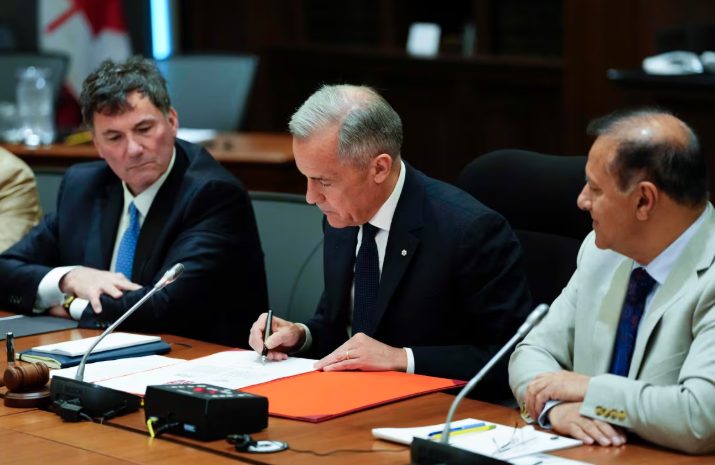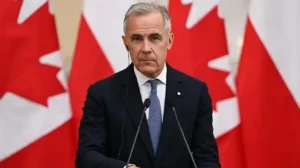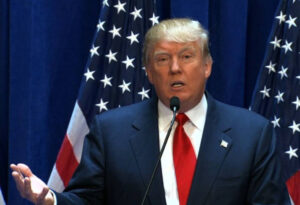Carney Cabinet Kicks Off Amid Rising Domestic and Global Headwinds

Ottawa, The Gulf Observer: Prime Minister Mark Carney’s freshly shuffled cabinet convened for its inaugural meeting Wednesday on Parliament Hill, facing a mounting stack of economic, regional, and geopolitical challenges. From trade tensions with the United States to Western alienation and affordability anxieties, the government’s to-do list is long and politically perilous.
With a backdrop of slow economic growth and a sliding export market, Carney wasted no time setting the tone — signing a “decision note” in front of cameras to direct Finance Minister François-Philippe Champagne to draft a long-promised middle-class tax cut.
Affordability First
Carney’s signature move, a hallmark of his campaign, would save two-income families up to $825 per year. “We’re acting on affordability as we look to build up this economy,” Carney said, striking a populist tone meant to contrast with past technocratic approaches.
Champagne confirmed the legislation will be tabled soon after Parliament reconvenes, but a full federal budget won’t arrive until the fall. The tax cut headlines what the government hopes will be a new era of fiscal pragmatism — but the macroeconomic headwinds are strong.
Auto Sector Blow, Green Strategy in Jeopardy
The federal government’s EV ambitions took a hit this week as Honda became the latest automaker to back away from Canadian investments, citing weak consumer demand and Donald Trump’s steep tariffs on foreign-manufactured vehicles.
Industry Minister Mélanie Joly, formerly in foreign affairs, promised to fight for workers. “We’ll make sure we’re in solution mode,” she said ahead of talks with Honda executives.
The setback underscores concerns about Canada’s ability to compete in the emerging green economy — once a major pillar of the Liberal platform. Whether Carney will adjust course remains to be seen.
Western Discontent Reignites
Carney is also confronting fresh turbulence from Alberta, where Premier Danielle Smith has called for a “reset” in Ottawa’s dealings with Western provinces. Smith has threatened referendums, potentially including one on Alberta sovereignty, and is already sparring with new Environment Minister Julie Dabrusin over her past opposition to oil sands expansion.
Meanwhile, Steven Guilbeault — now Minister of Canadian Culture and Identity — fanned flames by suggesting no new pipelines are on the horizon and that existing infrastructure is underused. “Maybe we should maximize the use of existing infrastructure,” he said, quoting a widely disputed 40% usage figure for the Trans Mountain pipeline.
The oil sector and Alberta officials swiftly rebutted the claim, noting pipeline utilization is closer to 77–80%. Smith called Guilbeault’s comments “misleading and destructive,” further inflaming tensions between the energy-rich province and Ottawa.
Natural Resources Minister Heads West
In response to Western unease, Carney’s new natural resources minister, Tim Hodgson — a former MEG Energy board member — is planning an imminent trip to the region. Hodgson vowed to work with industry and provincial leaders to secure a more “prosperous, secure and safe Canada.”
Saskatchewan’s Secretary of State Buckley Belanger echoed those sentiments, saying there are “Western voices at the table” now. “Carney is serious about bringing this country together,” he said.
U.S. Trade War and Diplomatic Strains
Amid the ongoing U.S. trade standoff, Carney has formed a high-level committee called the Secure and Sovereign Canada committee, tasked with navigating Canada-U.S. relations and protecting national interests. Defence Minister David McGuinty will chair the 10-member body.
Notably absent from that committee is Transport and Internal Trade Minister Chrystia Freeland — a past target of Donald Trump, who recently labeled her “a terrible person” (without naming her directly).
Freeland, however, appears undeterred, focusing instead on breaking down Canada’s own internal trade barriers. “Internal trade has begun to be sexy — it’s funny, but it’s true,” she quipped, noting the IMF projects a potential 4% GDP gain from streamlining interprovincial commerce.
Diversifying Trade
Carney has split trade responsibilities across three ministers, hoping to diversify Canada’s heavily U.S.-dependent export economy. International Trade Minister Maninder Sidhu acknowledged the imbalance, saying “we need to diversify trade,” though specifics on new market targets remain vague.
Government figures show a seven percent drop in exports to the U.S. since the tariff fight began — a worrying sign for a government looking to shore up economic resilience.


